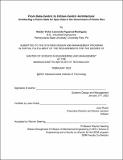From Data-Centric to Citizen-Centric Architecture: Architecting a Future State for Open Data in the Government of Puerto Rico
Author(s)
Figueroa-Rodriguez, Nestor Victor Leonardo
DownloadThesis PDF (3.316Mb)
Advisor
Rubin, Joan
Terms of use
Metadata
Show full item recordAbstract
Government institutions throughout the world have been working on transparency initiatives to build accountability with their constituents. One of these critical initiatives is Open Data. Open Data has as its primary objective creating transparency in Governments by liberating data sets stored in systems and databases under the custody of public agencies. Historically, this data has been challenging to find and often does not make it to the public domain. When it does, it is not easy for ordinary citizens to make it useful.
Governments have made strides to liberate these data sets. Architecturally, governments have been developing centralized systems that extract the data from many agencies to transform, store, and publish on a website for public access. However, these enterprise data architectures focus on data liberation and not on citizen value through relevant and contextual insights creation. In other words, instead of being citizen-centric, these architectures are data-centric. Since the objective is to liberate data, the full intended benefit is not realized. It creates an unintended effect: data inequality. Only people with data skills and corporations with resources extract the value and benefit of these data sets, while ordinary citizens cannot.
Puerto Rico, a territory of the US with a population of 3.1 million, is not the exception. In 2019, the Government of Puerto Rico passed Law 121 or Ley de Datos Abiertos. The objective is to publish data sets generated through the interaction of citizens with government agencies. Today, there are 98 data sets published through the Puerto Rico Statistics Institute (PRSI). However, the “as-is” architecture, which complies with the current law, publishes data sets in a format usable for a few skilled citizens. It requires data exploration, analysis, visualization, and interpretation before extracting key insights and motivating follow-up actions. It is not realistic to expect this type of work from ordinary citizens.
This thesis proposes a “to-be” Open Data architecture for the Government of Puerto Rico that extends the value and benefit of any published data set. The “to-be” architecture transforms the current data formats into meaningful and actionable insights while minimizing a possible data inequality issue.
Date issued
2022-02Department
System Design and Management Program.Publisher
Massachusetts Institute of Technology